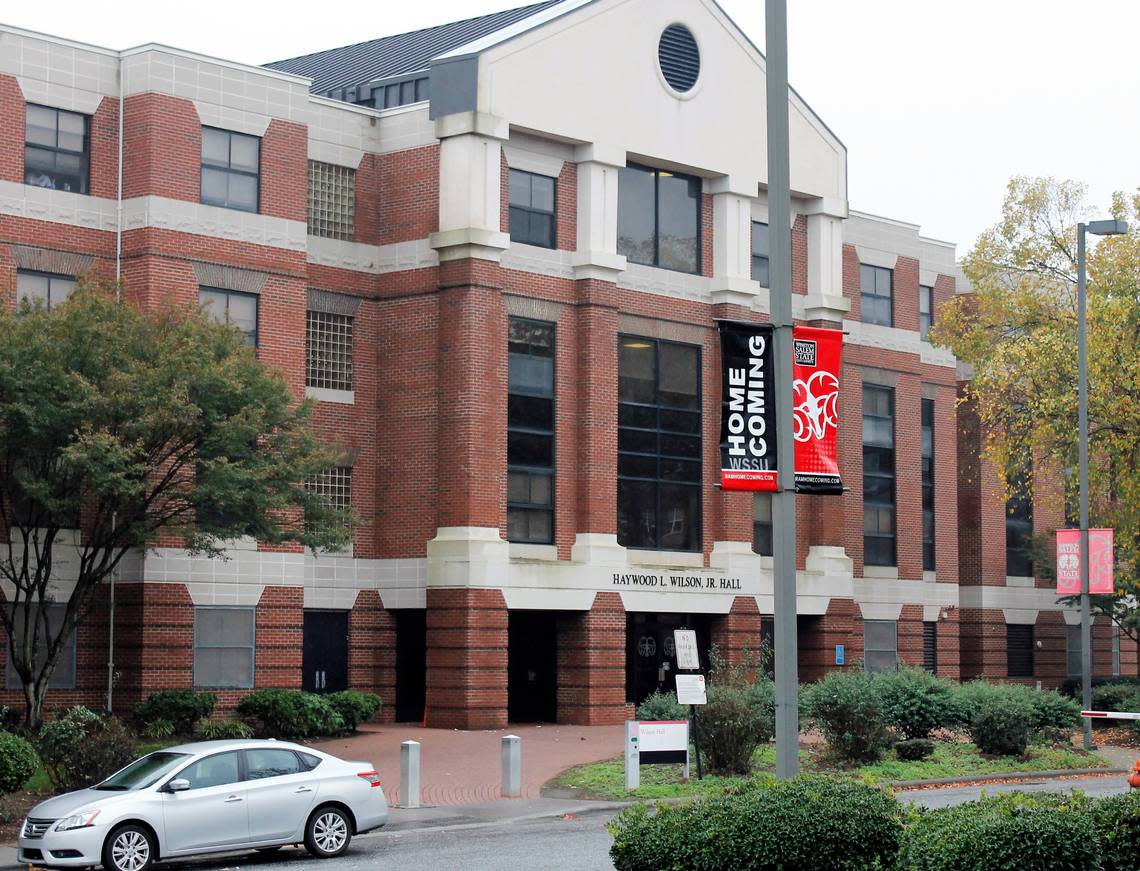Are NC HBCU professor’s racial slurs against boss protected by the Constitution?

- Oops!Something went wrong.Please try again later.
A North Carolina college professor believes his freedom of speech was violated when he was fired after writing a critical note to a supervisor teeming with racial slurs.
Alvin Mitchell still hasn’t found a court to agree with him.
In a 2-1 decision announced this week, a three-judge panel of the N.C. Court of Appeals upheld a 2018 decision by Winston-Salem State University to fire Mitchell, in part due to his racially charged written remarks to a department head over which academic conference two of Mitchell’s students should attend.
The ruling reveals a long-running academic dispute inside one of the state’s more prominent Historically Black Colleges and Universities, a case roiling with racial tensions, charges of implicit bias in academics, as well as a legal debate among the judges over the reach of First Amendment rights.
Mitchell’s attorney, Allison Tomberlin of Winston-Salem, said she plans to appeal.
“We’re looking forward to having our freedom of speech argument heard by the (state) Supreme Court,’’ she told The Charlotte Observer in a Wednesday phone interview.
The faculty in-fighting flared up at the 130-year-old school during the 2016-17 academic year, when Mitchell’s students requested university money to attend a Race, Gender and Class conference in New Orleans where they hoped to present a research paper.
Instead, Dr. Denise Nation, one of Mitchell’s direct supervisors, suggested an academic event sponsored by the American Society of Criminology.
According to the appeals court opinion, one of the students believed Nation preferred the other conference because it was “primarily Caucasian.”
Mitchell, a tenured associate professor of Justice Studies, took it from there.
In his letter to Nation, he railed against her recommendation and stood up for the academic rigor of the New Orleans event.
Moreover, he dismissed the ASC conference as being run by “nothing but a bunch of white men,” and accused his boss of making her decision largely to ingratiate herself with white peers. Both Nation and Mitchell are Black.
“After all these years, it is amazing that you think anything white is better,” he wrote.
“In their eyes you will never be equal to them. They still look at you as a wanna be white, an international n-----, an international c--n and an international sambo (lol) because you display that kind of behavior.
“You will never get it. Wake up.”
In Mitchell’s termination notice, the university cited the letter, along with Mitchell’s failure to give a final grade to one of his students in a 2015 class. That misstep, according to the court’s opinion, threatened the student’s financial aid and eventually led to campus police being called to an angry classroom confrontation between Mitchell and several superiors.
(The supervisor who summoned police, Dr. Cynthia Villagomez, made national headlines in December when she called campus officers to her own classroom to have a student arrested following an argument over an assignment.)
The school also accused Mitchell of failing to open an online class during the fall 2017 semester that he had been assigned to teach.
After twice overruling the university’s Faculty Hearing Committee’s finding that university administrators had not made their case, school Chancellor Elwood Robinson fired Mitchell in January 2018 for neglect of duty and, due to the letter, misconduct.
Mitchell appealed. His firing was upheld by Winston-Salem State’s Board of Trustees, the Board of Governors of the UNC System and, in July 2021, Superior Court Judge Martin McGee.
On Tuesday, the panel from the state’s second highest court followed suit — with one major exception.
In their opinion, Appeals Court judges Toby Hampson, Valerie Zachery and Hunter Murphy dismissed Mitchell’s claims that his firing had violated his due process rights.
But the court’s consensus ended over Mitchell’s argument that since his letter had “touched upon a matter of public concern,” his firing had been illegal.
In her written argument, Tomberlin described Mitchell’s letter as “an impassioned plea” and a “strongly worded condemnation of racism within academia and Nation’s perceived participation in that racist culture.”
Once again, Hampson and Zachary disagreed. They ruled that Mitchell had presented no evidence to show that Nation’s decision to deny the students money for the New Orleans conference had been based on race, or that Mitchell “intended his letter to be an effort to combat racism in academia.”
Rather, the judges found that Mitchell’s written remarks were “nothing more than an expression of his personal grievance towards Dr. Nation” and her decision to withhold the expense money.
“That Petitioner did so by invoking his own racist epithets does not convert his letter into one addressing a matter of public concern,” Hampson wrote.
Murphy differed, arguing that Mitchell had made a legitimate First Amendment case that should be returned to the Forsyth County courts for a full airing.
“The broader subject of academia’s relationship with race has long been acknowledged as a subject of public concern and remains so, now more than ever,” Murphy, wrote in his dissenting opinion.
The Waynesville Republican also alluded to the ongoing nationwide furor over Critical Race Theory, an academic course of study holding that racism is entwined throughout the American way of life.
“The way race is taught in schools has become one of the defining political issues of this decade,” he wrote. “Few topics could be more legitimately said to constitute issues of public concern.”
Rather than being a tool of “racial abuse,” Mitchell’s letter, according to Murphy, reads “as a defense of the academic legitimacy of a conference, an expression of dissatisfaction on the state of racial diversity in academia, and a statement of frustration with Dr. Nation, both personally and with any potential unconscious biases.”

